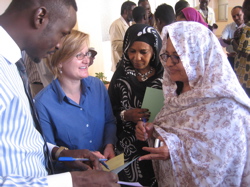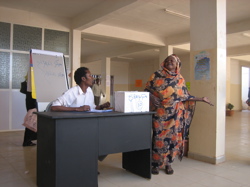The Education and Training Center/International was involved in two programs in Sudan in January 2009.
The Education and Training Center/International was involved in two programs in Sudan in January 2009.
January 4-5, 2009
The first program, a consultation of stakeholders to discuss the development of an undergraduate peace studies program, hosted participants from fourteen universities, regional peace studies centers and members of the NGO community. Sudan’s Minister of Higher Education, Dr. Peter Adwok Nyaba, gave the keynote speech, emphasizing the need for educational programs that teach unity and diversity. Dr. Adwok commended the peace studies project as one that will build enormous social capital for Sudan in creating a new attitude of tolerance and forgiveness. Senior Program Officer, Dr. Linda Bishai, spoke about the different disciplines that contribute to peace studies, presenting participants with several examples of curricula for comparison. Bishai referred to the USIP Undergraduate Curriculum Development Guide by Senior Program Officer, David Smith, as a useful resource for guidance on course content. The consultation involved plenary and working group discussions about the structure, content, and timing for the development of Sudan’s first undergraduate peace studies course. Participants decided to support a 40-hour pilot course in the summer of 2009.
January 6-9, 2009

The second program involved collaboration between ETC/I and the Center for Conflict Analysis and Prevention (CAP). ETC/I’s Jacqueline Wilson and Linda Bishai joined CAP’s Kelly Campbell in presenting a training designed to enhance the understanding of electoral violence triggers and non-violent measures to deal with conflict when it arises. In addition, the workshop tied election processes with citizenship concepts, democratic principles and civic rights and responsibilities. More than fifty participants from diverse regions and affiliations (including universities, NGOs, political parties and journalists) learned that conflict resolution skills such as negotiation and communication are key elements in sustaining a peaceful democracy. Workshop methodology was highly interactive, with participants working in small groups, engaging in role-play and games and being encouraged to discuss the presentations. Groups worked on reading election case studies and answering discussion questions regarding triggers for violence and the nature of the response. One of the more significant sessions during the workshop involved a panel discussion on electoral violence with a constitutional law professor and a high-ranking legal officer from the police academy. Many participants appreciated the opportunity to ask questions of a police officer in a neutral environment and the officer, for his part, seemed to appreciate the opportunity to answer these questions in a controlled manner. Workshop participants were also treated to the performance of a new voter education play by well-known local dramatist Mohammed Sharif. The play explores questions of voter identity, understanding the ballot, bribery and gender relations. Many participants expressed their appreciation for the timing and content of this workshop. Several mentioned that it was unique and much needed. Many also appreciated the experience of learning in a group with such diverse backgrounds.



